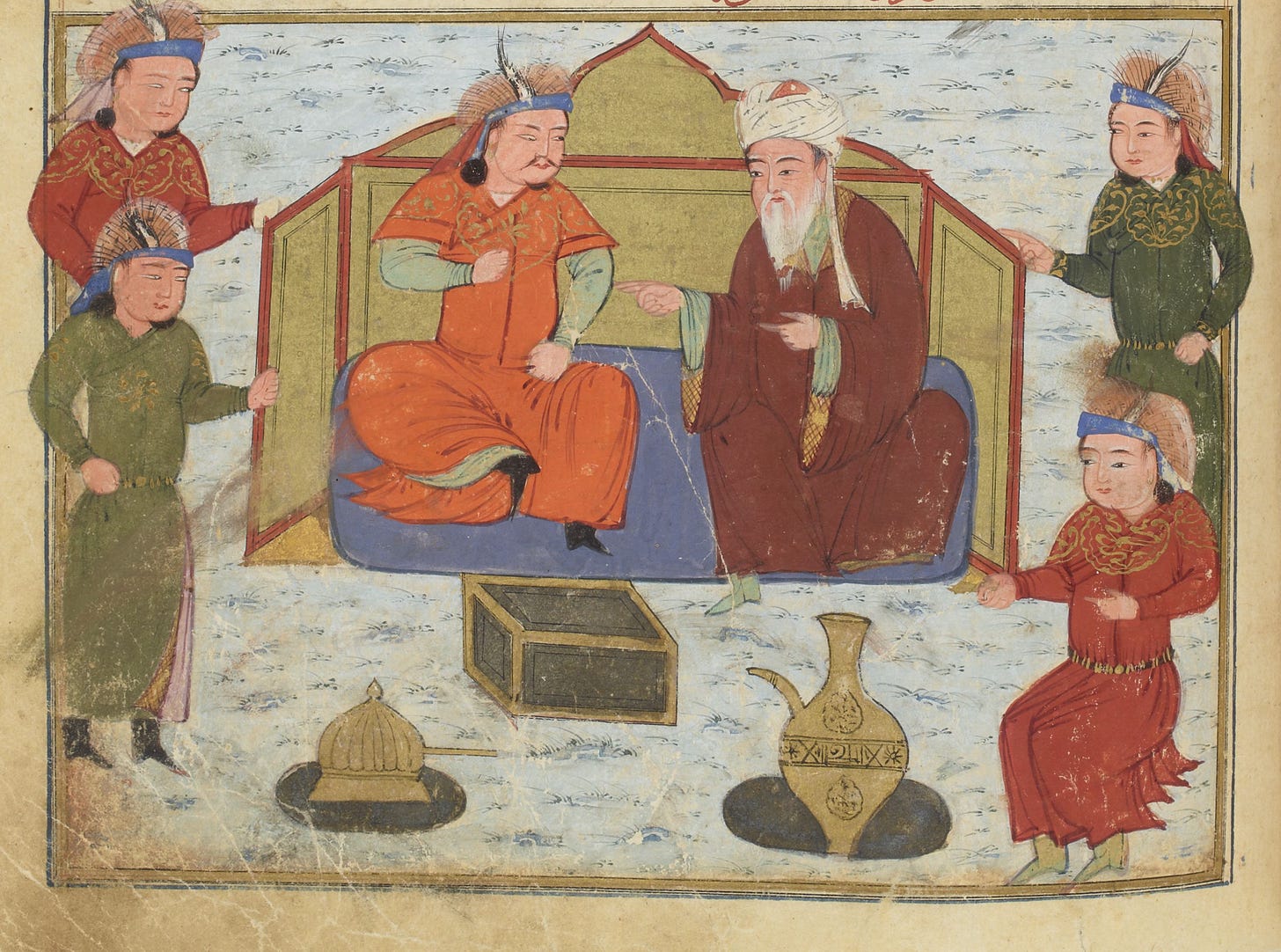Accelerationism, the Mongols, and the Post-Liberal World
A Post-Liberal Vision Through a Mongol Lens
Liberalism is dead. Everyone knows it. And its loudest defenders are the ones doing the most to undermine it. Storming the Capitol, undemocratically pre-selecting a party’s presidential candidate, gerrymandering, attempting to convince the Electoral College to overturn elections: these are not things that you do if you actually believe in the principles of liberalism. The slow, quiet death of liberalism is the elephant in the room that no one wants to talk about.
The flaws of liberalism are laid plain for everyone to see. Without the specter of an existential threat looming on the horizon – both fascism and communism failed to unseat liberalism – its own internal contradictions and inconsistencies are visible to all. Instead of maximizing liberty, it has led to a system with an oligarchic aristocracy above the rules, entrenched political corruption, runaway technology that actively reduces our liberty, and systematic inequality.
When an old order dies, world-shaking upheaval is inevitable. Out of the ensuing chaos comes the seeds of something new. Look at the Mongols. When they arrived on the scene in the 13th century, the old systems of Muslim political organization were dying. The Abbasid system of investiture had failed to keep up with a changing world. The Abbasid caliph in Baghdad was barely a figurehead, rarely exercising any power outside of his palace. The various Muslim polities that actually held power were in constant conflict over questions of succession and legitimacy. That a rag-tag group of a couple thousand Frankish Crusaders could take and hold Jerusalem for almost a century was a sign that the current system was failing.
In 1258 the grandchildren of Chinggis Khan sacked Baghdad, executed the last Abbasid caliph, and imposed their rule over much of the Muslim world. But the destruction caused by the Mongols, as tragic as it was for those who experienced it, was a necessary ingredient in the development of a new order in the Middle East and the world in general. New frameworks for governance were explored and implemented: Turko-Mongol sovereignty, Mamluk slave sultanates, and Sufi metaphysics intersecting with sultanic authority.

Without the weight of tradition, Muslims were free to explore new avenues in political theory, still constrained by the principles of an Islamic framework, but better able to adapt to a new social and political reality as they shifted from the medieval to the early modern world.
The Ottomans explored an amalgamation between frontier militarism, legalistic institutions, and Sufi metaphysics. The sultan was less interested in old notions of Muslim political authority and instead explored new titles. He was Sultan-i Rum, Qutb-i Zaman, and Ghazi ibn Ghazi. The Mughals maintained aspects of Chinggisid authority, merged with Indian patronage systems and millenarian mysticism. Theirs was a mix of Central Asian tribal loyalties and the burueacractic-military administration of India’s rigid caste system. Even the Egyptian Mamluks, who were the most traditional-minded, maintaining a vestige of the Abbasid caliphate in Cairo were still innovative in creating a new theory of administrative and military slavery that would produce sultans and patronize a new era of Islamic intellectualism. It was the Mamluks who put a definitive end to the Crusades, closing that chapter of the Medieval world. The Mongol irruption was destructive, but it created the conditions for an even more robust political world that succeeded it.
Just like the 13th century, we again find ourselves at a crossroads. Liberal democracy is faltering and new ideas are bubbling just under the surface, waiting for their moment. This is an age of acceleration. The old certainties are out the door, and we hurtle towards a post-liberal future.
Muslims should be at the forefront of this transformation, not trying to prop up the broken system. The era of clinging to past systems, of waiting for the liberal West to uphold its own theories of human rights, of nostalgic pining for the return of the Ottomans while watching Ertuğrul, it all must come to an end.
Romanticizing the past is not a political theory, and it isn’t a path forward. To thrive in this new era, Muslims must engage with the realities of the present and the possibilities of the future. Just as Islamic political thought adapted to the seismic shifts of the Mongol era, it must now rise to the challenge of addressing the socio-political realities of the 21st century.
This is not a call to abandon Islamic principles; rather, it is a call to recognize their flexibility and applicability to new contexts. The frameworks that emerge must be forward-facing, not backward-looking. They must be grounded in the imperatives of justice and divine sovereignty, while also addressing the complexities of a rapidly changing global order.
In every moment of historical transformation, there are those who cling to the old and those who shape the new. From the Mongol era we see that the destruction of an old order is not the end but a beginning. Muslims have the opportunity to take part in shaping what comes next. The question is whether they will they be passive actors, allowing the world to impose itself on them or will they exercise their agency and be at the forefront of the post-liberal world.




I hope one of the consequences of a post liberal order in America and the west will be the shedding of the inferiority complex that has plagued immigrant Muslim communities for so long.
When the west no longer claims moral and civilizational superiority by way of liberalism, our community will have to look at our own tradition and realize what we didn’t value all this time
Where would you recommend a native English speaker with Arabic proficiency begin to learn Ottoman Turkish? It would be good to see a write-up on that: pitfalls to avoid, hacks that worked for you, that kind of thing.